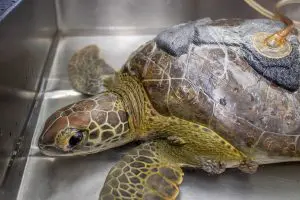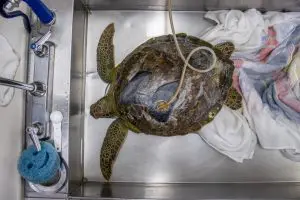

Bones is described as having a spunky personality!
Our Sea Turtle Healing Center is working around the clock to rehabilitate its newest patient, a juvenile green sea turtle named Bones.
To any Star Trek fans reading, this lively turtle was named after Dr. Leonard McCoy, who is famously nicknamed “Bones” in the show!
The younger juvenile sea turtle came to us on Star Trek Day after suffering a boat propeller strike to the carapace (shell). Rescued from the river of Long Point Park in Melbourne Beach, Bones was brought in by a volunteer with the Sea Turtle Preservation Society.
Unfortunately, the injury collapsed both of the turtle’s lungs and exposed at least one of them, leading to multiple fractures and lung damage, said Shanon Gann, Sea Turtle Program Manager.
So far, all the turtle’s damaged bones have been carefully removed and their wounds have been cleaned. We also began negative-pressure wound therapy to treat Bones’ carapace wounds. This treatment acts as a suction over the wounds to decrease swelling and remove excess fluids while speeding up the healing process.

Bones receives negative-pressure wound therapy at our Sea Turtle Healing Center.
Bones also tested positive for fibropapillomatosis (FP), a tumor-causing disease that hinders sea turtles’ ability to swim and makes them more prone to infections, predator attacks and boat strikes. Our team plans to allow Bones’ carapace wounds to heal before removing the FP, Shanon said.
Right now, we’re optimistic that Bones will respond well to treatment. This tough turtle undoubtedly has a long road to recovery, but our Healing Center team will be there every step of the way.
“We believe Bones was a healthy turtle with FP when hit by the boat,” Shanon said. “We are working with this turtle’s fighting spirit to support healing from this life-threatening boat interaction.”
The tragic reality is that most boat strikes are fatal, and this is a common injury that brings turtles into our care. Sea turtles in our local waterways face major risks if we don’t take proper precautions.
Boaters can help by assigning a passenger to watch out for wildlife and reducing their speed. Investing in a propeller guard can also protect sea turtles and your vessel from harm.
By taking these simple steps, we can make a meaningful difference to make sure our waters remain safe for both sea turtles and boaters alike.
Have you found a sea turtle that needs help? Visit this page or call the Sea Turtle Preservation Society at 321-206-0646. Want to help the Sea Turtle Healing Center? Support our Zoo, or view our Healing Center’s wishlist.